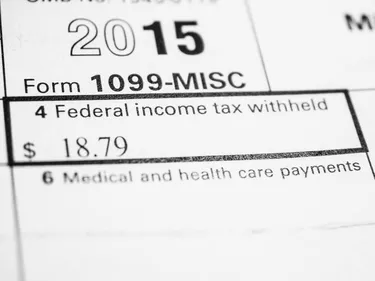
Benefits paid to a chronically or terminally ill person and reported on Internal Revenue Service Form 1099-LTC are usually excluded from income and therefore not subject to income tax. The exclusion isn't unlimited, though. Depending on the kind of contract that produced the benefits and the total amount received, benefits may be partially taxable.
Form 1099-LTC
Video of the Day
The "LTC" in the form stands for "long-term care." Many insurance companies offer long-term care insurance, which pays certain medical and personal care expenses for people who become chronically ill and are unable to care for themselves. When an insurer pays such benefits, it must report the amount paid on Form 1099-LTC and send a copy to the recipient of the benefits and to the IRS. "Viatical settlement providers" also must report payments on Form 1099-LTC. A viatical settlement provider is an individual or company that pays the same kind of benefits to a person in exchange for being named the beneficiary of that person's life insurance policy.
Video of the Day
Qualified vs. Non-Qualified
Benefits reported on Form 1099-LTC will be taxable if the long-term care insurance contract or viatical settlement contract does not meet the IRS definition of "qualified." In general, any contract issued prior to 1997 is qualified as long as it met the requirements for such contracts in the state where it was issued and hasn't been substantially changed since being issued. Contracts issued in 1997 and afterward are qualified if the benefits are payable only for specific medical and personal care expenses of a person who has been certified by a doctor or other health care professional as chronically ill. If benefits are paid under a non-qualified contract or for expenses not allowed by law, they are taxable. Section 7702B of the Internal Revenue Code covers the requirements for qualified plans and eligible expenses in depth. (See Resources.)
Amount of Benefits
Even under a qualified long-term care contract, the amount of tax-free benefits a person can receive isn't necessarily unlimited. If the contract simply reimburses the beneficiary for covered medical and personal care expenses--or pays those expenses directly--then the benefits aren't taxable. If this is the case, the space for "Reimbursed amount" will be checked in Box 3 of Form 1099-LTC. Many long-term care contracts don't work by reimbursement, however. They simply pay a certain amount on a regular basis. In that case, the space for "Per diem" will be checked in Box 3. Per-diem beneficiaries must figure out their own tax responsibility.
Calculating Exclusion
To calculate whether any long-term care benefits are taxable, start by adding up the total cost of all covered medical and personal care expenses during the payment period. If benefits are paid monthly, total the expenses for the month. If they're paid weekly, total the weekly expenses and so on. From that total, subtract any amounts reimbursed by health insurance or Medicare. Call the result "amount A." Then multiply the number of days in the payment period by the daily exclusion rate set by the IRS. As of 2010, that rate was $290. Call that "amount B." Subtract whichever amount is larger, A or B, from the benefits paid for the period. Anything left over is taxable income. IRS Form 8853 walks beneficiaries through these calculations.
Accelerated Death Benefits
Form 1099-LTC is also used to report payments of "accelerated death benefits," which are early benefits from a life insurance policy that a seriously ill person can use to pay expenses while still living. If a person has been certified by a doctor as chronically ill, accelerated death benefits are subject to the same tax rules as long-term care benefits. But if a doctor has declared the beneficiary to be terminally ill--that is, likely to die from the condition within two years--the accelerated death benefits are not taxable at all, with no limitations.